
MICRO DEGREE
High-Speed PCB Design
High-Speed PCB Design
100% LIVE Interactive Classes
High-Speed PCB Design
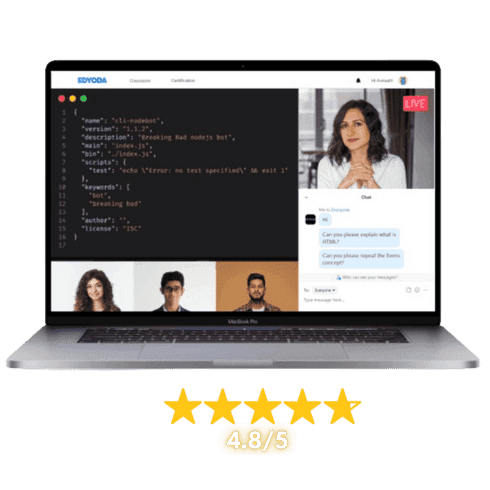
100% LIVE Interactive Classes
Reserve your spot today!
Basic Info
Select Offers
Application closes on:06 Feb 2026
Get instant access of pre-course material!
Talk to Us
We’re here to help! Reach us at:
What is in it for you?
Shape the future with High-Speed PCB Design
 100% Live Classes
100% Live Classes
 Instructor-led Live Sessions
Instructor-led Live Sessions
Attend 4 weeks of instructor led live classes from the top 1% industry experts
Projects & Case Studies
Projects & Case Studies
Gain hands-on experience with projects and real-world case studies for impactful learning
Verified Certificate
Verified Certificate
Earn a industry recognized certificate and kick start your career
Session Recordings
Session Recordings
Revisit older chapters anytime with recorded sessions
Flexible Schedule
Flexible Schedule
Choose live classes from different cohorts that fit your availability.
Study Materials
Study Materials
Access comprehensive study materials designed to enhance your learning experience
100% Moneyback Guarantee
Grab your slot before the offer expires
Discount applicable for next 10 candidates only.
Reserve your spot today!
Basic Info
Select Offers
Application closes on:06 Feb 2026
Get instant access of pre-course material!
Talk to Us
We’re here to help! Reach us at:
Learn from Top 1%
Sr. Managers, VPs, CXOs, Directors & Founders from companies shaping the future.

Combo Offers
Create Your Own Combo
100% Moneyback Guarantee
Available in 4 monthly installments at $156/month
Reserve your spot today!
Curriculum
A Curriculum designed for your success
Live Sessions Schedule ![]() Sat - Sun (Weekends Only)
Sat - Sun (Weekends Only) ![]() Timing 7:00 AM - 9:00 AM / 8:30 AM - 10:30 AM / 11:00 AM - 1:00 PM / 5:00 PM - 7:00 PM / 7:30 PM - 9:30 PM EST
Timing 7:00 AM - 9:00 AM / 8:30 AM - 10:30 AM / 11:00 AM - 1:00 PM / 5:00 PM - 7:00 PM / 7:30 PM - 9:30 PM EST
- Evolution of high-speed digital systems and PCB requirements
- Differences between standard and high-speed board design
- Understanding signal integrity, timing, and noise challenges
- Overview of design flow: schematic to layout to validation
- Tools used in high-speed design (Altium, Cadence, KiCad, HyperLynx)
- Industry applications: computing, networking, automotive, and AI hardware
- Transmission line theory and wave propagation
- Reflections, crosstalk, and ringing in high-speed traces
- Impedance control and differential pair concepts
- Termination techniques and signal damping strategies
- Eye diagrams, timing windows, and jitter analysis
- Simulating signal integrity using SI tools and models
- PCB substrate materials and dielectric properties (FR4, Rogers, etc.)
- Controlled impedance and its dependence on stack-up geometry
- Layer stack-up planning for signal, power, and ground planes
- Role of reference planes in noise and EMI reduction
- Designing multilayer boards for high-speed systems
- Case study: optimal stack-up for a 6-layer DDR4 board
- Differential pair routing: principles and design rules
- Length matching and timing skew compensation
- Via design, stubs, and signal return paths
- BGA fan-out and escape routing for dense designs
- Routing constraints for DDR, PCIe, USB, and Ethernet
- Simulation-based verification of routing performance
- Understanding power distribution networks (PDN)
- Decoupling capacitor selection, placement, and optimization
- Analyzing voltage droop and power rail noise
- Grounding strategies and current return management
- PDN impedance measurement and simulation
- Case study: designing low-noise power delivery for FPGA systems
- Overview of high-speed standards: DDR, PCIe, HDMI, USB, SATA
- Timing, clocking, and synchronization requirements
- Equalization and pre-emphasis for long trace compensation
- Eye diagram interpretation and compliance validation
- Differential pair skew tuning for interface compliance
- Real-world design examples and layout considerations
- Root causes of EMI and coupling mechanisms in PCBs
- Ground plane segmentation and layout partitioning
- Shielding techniques and guard trace implementation
- Common-mode choke and filtering applications
- Design rules for minimizing radiated and conducted emissions
- Pre-compliance EMI/EMC testing and layout corrections
- Heat generation in high-speed and dense PCBs
- Thermal vias, copper fills, and heat spreading strategies
- Material selection and thermal coefficient management
- Thermal simulation and analysis techniques
- Reliability under temperature cycling and aging
- Designing for manufacturability and rework resilience
- Pre-layout and post-layout simulation workflows
- Signal integrity and power integrity simulation setup
- Crosstalk, eye diagram, and timing verification
- Using IBIS and SPICE models for simulation accuracy
- Correlation between simulation and lab measurements
- Common pitfalls in validation and how to avoid them
- DFM (Design for Manufacturability) and DFA (Design for Assembly) best practices
- Generating Gerber, ODB++, and manufacturing documentation
- PCB fabrication tolerances and quality checks
- In-circuit testing (ICT) and boundary-scan design preparation
- Design reviews, release process, and ECO management
- Case studies: production of a high-speed board from concept to final test
Mentors

Shome C
20+ Years, Sr. R&D Engineer, Ideaforge

Dr. Rohan M
10+ Years, Sr. Robotics R&D, Unbox Robotics
Course Includes

LIVE Interactive Sessions

Quizzes, Assignments & Projects

Study Materials & Session Recordings

Certificate
Course Includes

LIVE Interactive Sessions

Quizzes, Assignments & Projects

Study Materials & Session Recordings

Certificate
Course Pre-requisites
.ffb97545.png&w=16&q=75&dpl=dpl_2X6puNjuSG9CgzTr1NoFpPk8Uhfv) Basic electronics knowledge is required for this course.
Basic electronics knowledge is required for this course.
Outcomes
.ffb97545.png&w=16&q=75&dpl=dpl_2X6puNjuSG9CgzTr1NoFpPk8Uhfv) Design and develop high-speed PCB layouts with controlled impedance, differential pair routing, and optimized signal integrity for advanced digital systems.
Design and develop high-speed PCB layouts with controlled impedance, differential pair routing, and optimized signal integrity for advanced digital systems..ffb97545.png&w=16&q=75&dpl=dpl_2X6puNjuSG9CgzTr1NoFpPk8Uhfv) Implement stack-up design strategies using appropriate dielectric materials and layer configurations to ensure performance, reliability, and manufacturability.
Implement stack-up design strategies using appropriate dielectric materials and layer configurations to ensure performance, reliability, and manufacturability..ffb97545.png&w=16&q=75&dpl=dpl_2X6puNjuSG9CgzTr1NoFpPk8Uhfv) Simulate and analyze signal and power integrity using industry-standard tools such as HyperLynx, Altium, or Cadence to predict and eliminate design issues early.
Simulate and analyze signal and power integrity using industry-standard tools such as HyperLynx, Altium, or Cadence to predict and eliminate design issues early..ffb97545.png&w=16&q=75&dpl=dpl_2X6puNjuSG9CgzTr1NoFpPk8Uhfv) Apply EMI/EMC control, grounding, and shielding techniques to minimize interference and meet compliance standards for high-speed electronic products.
Apply EMI/EMC control, grounding, and shielding techniques to minimize interference and meet compliance standards for high-speed electronic products..ffb97545.png&w=16&q=75&dpl=dpl_2X6puNjuSG9CgzTr1NoFpPk8Uhfv) Perform thermal and reliability analysis to manage heat dissipation, improve product lifespan, and ensure robust operation under varying conditions.
Perform thermal and reliability analysis to manage heat dissipation, improve product lifespan, and ensure robust operation under varying conditions..ffb97545.png&w=16&q=75&dpl=dpl_2X6puNjuSG9CgzTr1NoFpPk8Uhfv) Prepare complete production-ready documentation, validate designs through simulation and testing, and ensure DFM/DFA compliance for high-speed PCB manufacturing.
Prepare complete production-ready documentation, validate designs through simulation and testing, and ensure DFM/DFA compliance for high-speed PCB manufacturing.

for successfully completing the 'High-Speed PCB Design' course conducted from 25 Dec 2025 to 05 Feb 2026
Add a Industry Recognized
Certificate To Your Resume
Industry Recognized
Certificate
Learn the best from the best

Career Advancements
Elevate your career with a respected certificate

Industry Respect
Gain credibility in the field

Networking
Connect with experts and peers

Opportunities
Attract exciting job prospects and promotions


for successfully completing the 'High-Speed PCB Design' course conducted from 25 Dec 2025 to 05 Feb 2026

100% Moneyback Guarantee
Top 1% Recruiters - Get interview access to 550+ Companies

Recommendations
Hear from our Learners

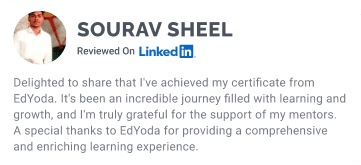






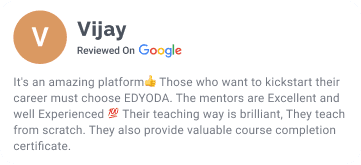
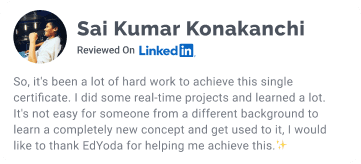





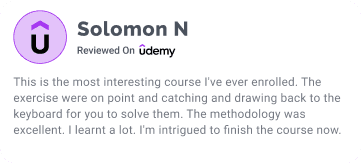
Looking for help? Here are our most frequently asked questions
What is a EdYoda Micro Degree?
EdYoda Micro Degree is an online, Live classroom based short-term course, where you get Live Sessions conducted by industry experts. It is designed to help you acquire practical & job-relevant skills quickly.
How do I register for the micro degree?
To register, visit the micro degree details page and fill up the registration form and make the payment to reserve your seat before the application closing date.
What happens after I register and pay?
After successful registration and payment, you will receive a confirmation email with instructions on how to access the online micro degree classes
Are there any pre-requisites?
All you need is a PC or Laptop to attend the online live classes and your commitment of 4 weeks. Apart from that there are no prerequisite for the Micro Degree.
What if I miss a live session?
We've got you covered! The session recording will be added automatically on the classroom platform after the session is ended.
Will I get a certificate after completion?
Yes. After successful completion of curriculum you will be provided a digital certificate which you can download and share with others.

What is a EdYoda Micro Degree?
EdYoda Micro Degree is an online, Live classroom based short-term course, where you get Live Sessions conducted by industry experts. It is designed to help you acquire practical & job-relevant skills quickly.

How do I register for the micro degree?
To register, visit the micro degree details page and fill up the registration form and make the payment to reserve your seat before the application closing date.

What happens after I register and pay?
After successful registration and payment, you will receive a confirmation email with instructions on how to access the online micro degree classes

Are there any pre-requisites?
All you need is a PC or Laptop to attend the online live classes and your commitment of 4 weeks. Apart from that there are no prerequisite for the Micro Degree.

What if I miss a live session?
We've got you covered! The session recording will be added automatically on the classroom platform after the session is ended.

Will I get a certificate after completion?
Yes. After successful completion of curriculum you will be provided a digital certificate which you can download and share with others.
General FAQs
Everything you need to know














